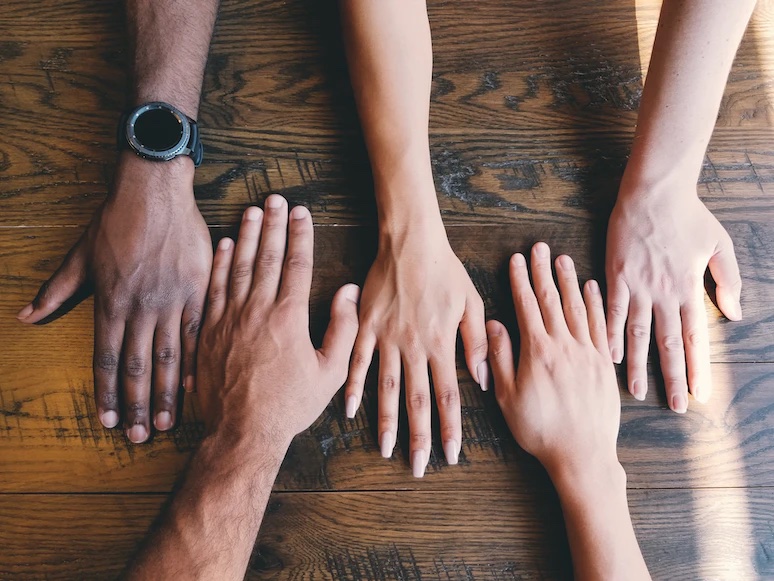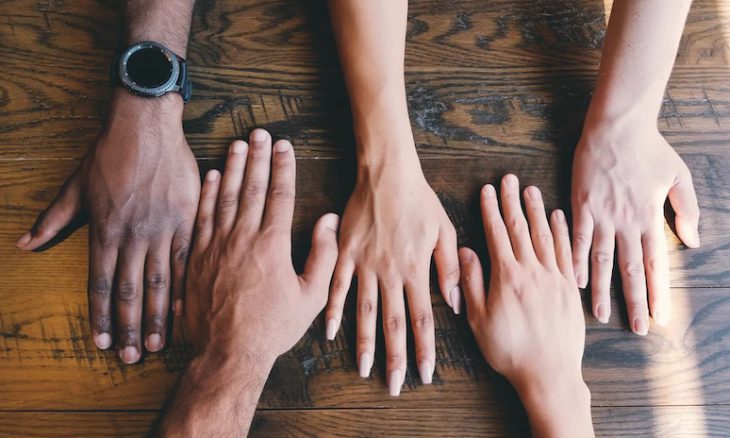The U.S. “Melting Pot“ of Race

From July to August 5, 2019, the Barna Research Group conducted a study with 2,889 American adults. The survey over-sampled practicing Christians and Black, Asian and Hispanic adults. A similar study was conducted a year later, both times addressing the questions of racism in America. The survey asked, “When it comes to ‘getting ahead’ in life, do practicing Christians think of their race as something that has helped or hindered them?”
In a blog for Prager University, attorney and frequent political commentator Larry Elder queried, “Is racism still a major problem in America?”
According to the Oxford Language Dictionary, racism is “prejudice, discrimination, or antagonism directed against a person or people on the basis of their membership in a particular racial or ethnic group, typically one that is a minority or marginalized.”
America has a clouded history of racism and racial discrimination. Books, papers, and articles fill library shelves. Fitchburg State University of Massachusetts set out a three-part timeline into which most racial history in the United States falls. From 1619 to 1865, they call “American Chattel Slavery; from 1865 to 1954, Segregation; thereafter until today, “Mass Incarceration.”
Slavery has been around for most of humanity’s existence, but it is a stain on the history of America, where “all men are created equal“ but were not treated that way. Although freed from slavery, African Americans, in particular but not exclusively, were denied access to many of the same facilities, including schools and public places, that were available to the rest of the population.
When it comes to the color of justice, The Sentencing Project contends that Black Americans are incarcerated in state prisons at nearly 5 times the rate of white Americans, and, nationally, one in 81 Black adults in the U.S. is serving time in prison. According to a Federal Bureau of Investigation report for 2019, 9.5 percent of all individuals arrested were white, 26.6 percent were Black or African American, and the remainder were of other races. Of juveniles, 62.5 percent were white, 33.9 percent were Black or African American, and the remainder were of other races. Of those arrested for murder, 61.3 percent were Black or African American, 45.7 percent were white. A 2020 report by the Pew Research Center says that the Black imprisonment rate in the U.S. has fallen by a third since 2006.
Part of what has grown out of statistics like these are concepts such as Critical Race Theory. According to The Heritage Foundation, “Critical race theory is an ideology which maintains that the United States is a fundamentally racist country and that American institutions such as the Constitution, property rights, color blindness, and equal protection under the law are vestiges of white supremacy, patriarchy, and capitalist oppression—all of which must be overthrown in the name of ‘antiracism.‘ Ultimately, critical race theory and ‘antiracism‘ policies would deepen racial divisions and undermine the very institutions that are essential to addressing poverty and inequality across all racial groups. Policymakers concerned about these issues should reject critical race theory and orient public policy toward rebuilding the institutions of family, work, and education, which have been proven to lift Americans of all racial backgrounds out of poverty.”
An outgrowth of the critical race theory is The New York Times 1619 Project. In its introduction to the project, the newspaper says, “If you want to understand the brutality of American capitalism, you have to start on the plantation.” In a separate item, The New York Times also says, “If true justice and equality are ever to be achieved in the United States, the country must finally take seriously what it owes black Americans,”—i.e., reparations.
In discussions of racism in America, the “equity or equality” question often arises. While the terms may seem similar on their face, they are actually dramatically different. According to the Marin County, California, Department of Health and Human Services, “Equality means each individual or group of people is given the same resources or opportunities. Equity recognizes that each person has different circumstances and allocates the exact resources and opportunities needed to reach an equal outcome.”
Heritage Foundation says, “’Equity’ is not the same thing as equality and delivers very different results. Rather than providing all individuals with equal opportunities to succeed, ‘equity‘ segregates individuals by race while driving a narrative of ‘oppressor‘ vs. ‘victim.‘ It calls for institutions to treat people unequally in order to achieve equal outcomes. Equity recklessly embraces legally prohibited classifications as a way to eliminate perceived differences in outcome, in violation of equal protection and federal law.” They state that this unequal protection is unconstitutional.
In 2021, President Biden set forth the goals of his administration in combating systemic racism. These include advancing racial equity in the federal government, working to address racism, xenophobia, and intolerance, and supporting historically marginalized populations both at home and abroad.
In an October 1, 2021, article in Decision, Dr. Alveda King, evangelist and niece of the late Dr. Martin Luther King, Jr., said, “Our nation is divided these days about the teaching of critical race theory in our schools. At the core of this discipline, which many progressives would like to see taught from kindergarten on, is the belief that racism underlies everything—our legal system, education, banking, housing, even language.”
She continued, “I’m not saying that racism has been abolished in America, because of course it hasn’t. But teaching black children or children of any group to hate and mistrust their white schoolmates, or anyone for that matter, will not end racism. Hate and fear will only perpetuate more hate and fear. As my uncle, the late Reverend Dr. Martin Luther King Jr., said, ‘Darkness cannot drive out darkness; only light can do that. Hate cannot drive out hate; only love can do that.’”
Followers of Jesus Christ are called to love without discrimination, be it racial or other types. “For there is no distinction between Jew and Greek, for the same Lord is Lord of all, bestowing his riches on all who call on him” (Romans 10:12). “But if you show partiality, you are committing sin and are convicted by the law as transgressors” (James 2:9).
How then should we pray?
- For the president and his administration as they seek to correct the wrongs of America’s past through equity initiatives.
- For empathy between races in America so people are able to understand and resolve differences and injustices.
- That U.S. educators and education officials would promote factual and accurate history as the curricula for America’s schoolchildren.
- For the Lord to give you insight into how you can contribute to spreading His love and peace in a divided society.
- That each follower of Jesus Christ would seek His guidance in addressing racism.





